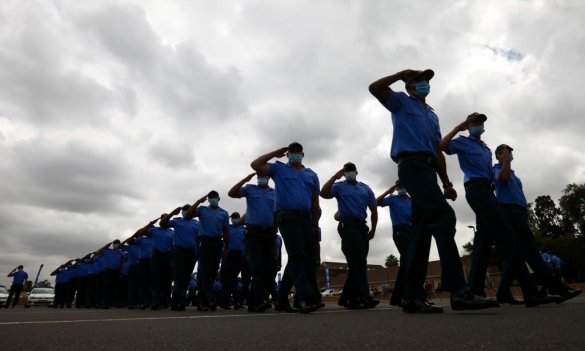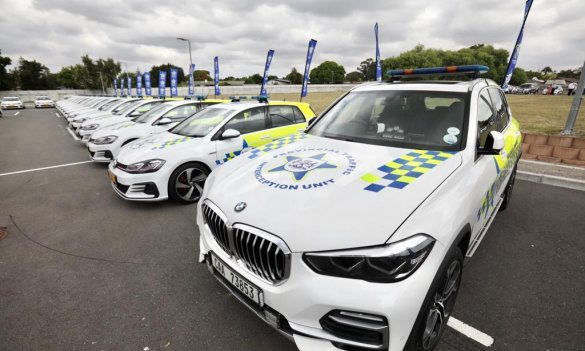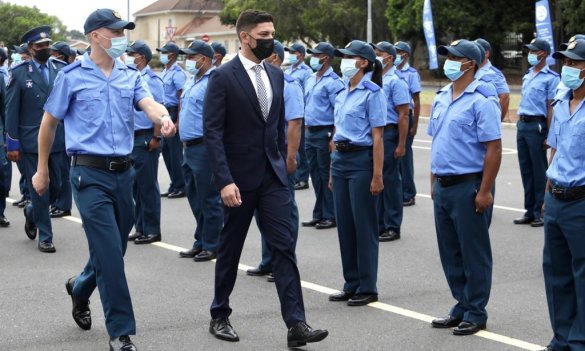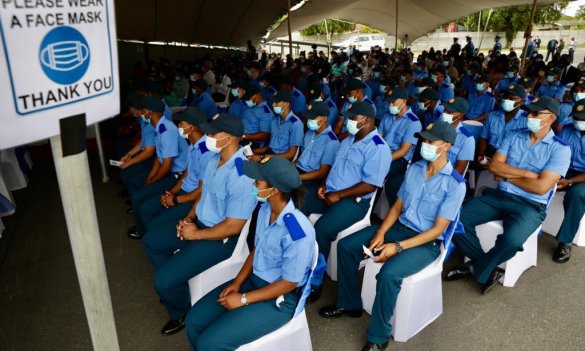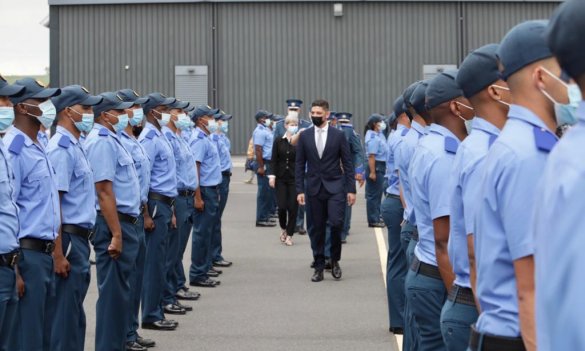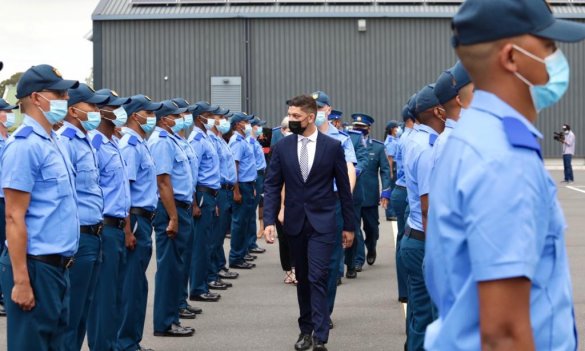Minister Mitchell launches Festive Season Traffic Plan – cautions habitual offenders
Media Release by Daylin Mitchell, Western Cape Minister of Transport And Public Works
As we come to the end of another challenging year, we are once again faced with the huge task of traffic law enforcement during a pandemic.
Just as in the previous festive season, it will not be business as usual as the country is still dealing with the invisible enemy, the coronavirus.
Despite all the challenges, our law enforcement officers will continue to provide structured traffic law enforcement and road safety interventions to influence all road users positively to demonstrate improved behaviour while using our road network to commute within and beyond the Western Cape during this festive season.
As part of my mandate as the Minister of Transport and Public Works, responsible for safer Western Cape Roads, and as a priority of the Provincial Safety Plan, I should like to take this opportunity to congratulate the Directorate: Traffic Training and Development on their continuous outstanding achievements in 2021.
Gene Louw Traffic College has successfully trained 86 new provincial students who will be deployed at various Provincial Traffic Centres across the Province, including in Knysna, Beaufort West and Vredendal in the North. Student 87, unfortunately contracted Covid-19 and will return in January 2022 to complete the final module of his training.
This group of enthusiastic, competent officers standing here today has been through a demanding, year- long accredited training course to complete the required Further Education and Training Certificate: Road Traffic Law Enforcement Course.
All of these graduates deserve our applause on their success as well as for the contribution that they will be making to ensure a safer society for all in the Western Cape. I also want to make special mention of the 12 students who achieved a Cum Laude average of above 75%, which is truly a remarkable achievement. We look forward to seeing how every member of this class translates the excellent training they have received into action – action which will save lives and make our roads safer places.
The year 2021 will always be remembered as the year of Covid-19. The College was faced with various challenges such as the third wave, which resulted in a complete suspension of the training. These challenges brought out the best in the College staff and management as they pushed the boundaries of creativity and innovation by using our available technology, with the development of the Moodle training application to ensure that students could continue with off- site training. All of these students have been trained on how to fully utilise all of our current technology which includes our in-vehicle technology, handheld devices and digital printing solution to issue traffic fines.
The closer cooperation within the Chief Directorate between training and law enforcement largely ensured these new officers will be arriving at Centres operationally ready as part of the new focus embracing technology. The experience of 2021 will be used to further enhance the blended training approach in 2022 and beyond.
Despite all the challenges experienced by both the learners as well as the staff of Gene Louw Traffic College, the practical exposure that the learners received during the year has tremendously assisted them in their preparation to render their services as traffic officers.
I have complete confidence in these newly qualified traffic officers. They will proudly represent Provincial Traffic Services and serve the citizens where they will be deployed to with respect and professionalism.
Tactical Approach:
Our primary focus this festive season remains the maintenance and the regulation of safe and responsible road user behaviour.
Provincial Traffic will also continue with the operational mandate to enforce all Disaster Management Act (DMA) regulations based on the applicable COVID-19 Alert Level, as required by the law.
Our tactical and operational plan has been aligned to the National 365 Road Safety Calendar. Extensive use of all our available data and information sources played a critical role when we compiled our detailed and approved Integrated Tactical Planning for this Festive Season which was divided into a three-phase approach namely:
- Phase 1: OCTOBER TRANSPORT MONTH 2021 -1st – 31st October 2021
- Phase 2: PRE - FESTIVE SEASON, FESTIVE SEASON -1st November 2021 – 15th January 2022
- Phase 3: POST FESTIVE SEASON - 16th – 31st January 2022
Our Integrated Provincial Interventions and Focus areas for this season include:
- Learner Transport operations
- Public Transport operations
- Weighbridge Operations: (Freight transport overload control, Long- distance buses,
- Movement of illegal substances and persons,
- Driver and vehicle fitness operations
- Alcohol enforcement
- Fatigue management operations
- Moving violations operations
- Seatbelt operations (Front and Rear)
- Speed operations and awareness
- Freight awareness
- Driver/Passenger / Pedestrian awareness
- Motorcycle awareness
- Farm worker transportation operations and awareness
Inter-Provincial Operations
Operational planning and the execution thereof will be done in conjunction with the Eastern Cape and Northern Cape as well as our Municipal colleagues to ensure operational consistency between provinces.
Operational priority will be given to:
- Public transport operations
- Speed offences
- Vehicle/driver fitness
- Fatigue awareness
- Commuter safety
- Legal compliance
- Driver/vehicle documentation
- Integrated SAPS operations – DMA regulations and compliance
Fatigue Management
Fatigue Management operations are planned and will be executed in conjunction with all role players within our Branch: Transport Management the Chief Directorate Transport Operations, Provincial Regulatory Entity and our external partners which include Emergency Medical Services, Forensic Pathology Services and SAPS.
The focus and objective of this intervention will be to specifically monitor, regulate and enforce Public Transport vehicles travelling inter provincially on all major routes using an electronic application which was developed to address driver fatigue and has contributed significantly to the reduction in the total number of public transport vehicle crashes, and fatalities throughout the year.
Using the handheld devices and other available technology, the system is capable of creating a log of public transport drivers which we can track key fatigue-indicating data such as departures and arrival points, driving times, speed profiling as well as vehicle tracking.
The fatigue alerts assist officers to identify and stop drivers who may have been driving without a rest period for further investigation which also entails screening for physical signs of fatigue. Blood pressure and glucose tests are performed by Emergency Medical Services.
Fatigued drivers will be compelled to rest before continuing their journeys.
The implementation of these well-established operations creates a safe environment for any other motorist to voluntarily at these venues to have a rest period thus applying the 2-hour driving time or 200km rule.
We will be introducing additional fatigue awareness operations on the N1 Touwsriver as well as the N2 Albertinia and Petroport.
Fatigue operations will include but not be limited to the following:
- Passenger/commuter safety
- Passenger overloads
- Driver and vehicle fitness and/or documentation
- Driver Fatigue
- Driving under the influence
- Driver behaviour
Pedestrian Programme
The unpredictable movement of pedestrian and more specifically intoxicated pedestrians across the province has been the largest contributor to our fatality rate throughout the year, and the Festive Season is no exception.
As part of our integrated Pedestrian Safety Plan which our Directorate: Road Safety Management will spearhead, the focus will be on:
- Visibility
- Jaywalking
- Destructive and Distracted Walking (Drinking and Walking and the use of cellphones)
The pedestrian plan will be supported by an extensive media and social media campaign to reach the general public.
Habitual Offenders:
Our current in vehicle technology and ASOD sites technology enabled us to determine the extent of our top 500 habitual offenders that use our road network, and which have been categorised into the following groups:
Avanza Long Distance Travelling
- data set 01/09/2020 – 01/09/2021
- There are several vehicles travelling on the Western Cape road network that are being utilised as public transport without the necessary permits and registrations.
- Speed – as they are not registered as public transport, they can travel at private use speed (120Km/h)
Unlicensed Motor Vehicles
- data set 12/112019 – 11/11/2021
- Vehicle licensing renewal has been under pressure during the various alert levels of COVID-19 during the largest part of 2020 and 2021. Various extensions have been allowed regarding driver licence renewal, but no extension has been given to vehicle licence renewal and the focus is primarily on licences that expired more than 18 months ago.
ASOD Speeding Offences
- data set 01/03/2020 – 12/11/2021
- Focus of the ASOD camera network is to change behaviour of drivers and reduce speeding within the Western Province.
- The analysis was done to identify infringements per vehicle in order to list the top offenders.
- Only vehicles that transgressed more than 10 times during the 21-month period were included in the dataset.
Officers at all traffic centres have been briefed about this initiative to ensure that they react appropriately when they stop and approach any of these 500 vehicles/drivers identified as a habitual offender.
In conclusion, I would like to state the support of the Western Cape Government, and that of my Department and its officials for the new United Nations Decade of Action for 2021 to 2030 for Road Safety.
It is an honour to receive the WHO’s Global Plan from South Africans Against Drunk Driving and the SADC Alliance of Road Safety NGOs today.
In 2010, when my predecessor Robin Carlisle announced the Department’s support for the first UN Decade of Action for road safety, the road death rate in the Western Cape stood at 29,25 deaths per 100 000 population. With its support for the Decade of Action, the Western Cape Government accepted the challenge of a fifty percent reduction in road traffic fatalities by 2020. In 2020, the death rate on our roads stood at 15,82. This is a reduction of forty six per cent (46%), a significant marker of how much safer our roads have become.
While this is a fantastic achievement, we must be realistic before we pat ourselves on the back. In 2010, 1453 people were senselessly killed on Western Cape roads. In 2020 this number was down to 1108, a decrease of 23,7% in absolute numbers of fatalities, a much lower decrease than in the death rate. Some of our gains come from the lockdowns imposed in the face of the Covid-19 pandemic. Much remains to be done, especially as our economy opens and alcohol sales and consumption patterns return to normal.
Alcohol continues to be central to traffic injuries in our province, for pedestrians as much as drivers and passengers, and we can expect fatalities rising again as access to alcohol increases.
I would like to plead with everyone who will be visiting the Western Cape always to follow the Covid-19 golden rules of hygiene to keep us all safe during the festive season.
Those who are using public transport must wear their face masks and ensure there is always good ventilation.
I wish you all a safe Festive Season.
Media Queries:
Ntomboxolo Makoba-Somdaka
Spokesperson for Minister Daylin Mitchell
Cell: 082 953 0026
Email: Ntomboxolo.Makoba-Somdaka@westerncape.gov.za

